Tuesday 7 December 2010
She was three years older now and knew better than to look for romance in tragedy.
— Lady Gwynn, “Gwynn is the only witness”
I saved this list for third because I wanted to get the “Greatest Tear-jerkers” and “Hottest Moments” out of the way. Otherwise, how could I do a list of “Most Romantic” without putting “Alred sees no poetry” at the top of it? How could I get away without mentioning “Malcolm goes out into the rain”?
Now that we have ensconced those chapters as best-ofs in their own categories, I wanted to talk about the moments that have been “soooo romantic!”—the way Gwynn sees it when she’s not getting the romantic confused with the erotic.
I want to talk about those chapters that elicit either a happy, snuggly Awwwww! of romantic sweetness, or else a Whoa! of “Now that’s love!” I think the distinction I am looking for here is that there is a romantic act or gesture, and not merely a romantic situation that two people happen to be in. Somebody is taking a step. It’s just the sort of thing Gwynn would like to hear in a story.
Sadly for Miss Gwynn, she hasn’t had a superbly romantic chapter of her own yet, but I am certain she will make the top 10 of 2015. ![]()
10. “Sigrid is steadfastly minded”
Published: November 22, 2006
Chapter Date: October 5, 1083
Synopsis: Now several years married, Sigrid has been living in Lothere with her brother Brede while Eirik has been abroad making a name for himself. Their marriage was not happy at the start, but it has mellowed since the birth of their second child. Eirik tells her that he must go away again and fears she will be unhappy because he wants to take her and the children with him this time. Sigrid assures him she wants to go, beginning out of a sense of duty, but as she explains why, she realizes she truly did miss him and wants to be with him now.
I might have put “Sigrid hears a call” in this list in addition to or instead of “Sigrid is steadfastly minded,” but there is an unfortunate air of deceit—however well-intentioned—in the actions of both Sigrid and Eirik in “Sigrid hears a call.”
For pure romance I like the emotional honesty in this chapter better, and I like the steps they both take towards each other at the end.
For Eirik there is this:
She knew that such things were not self-evident between them, and yet they had to go without saying. Eirik could not tell her he loved her in any language. She knew now how false it had been when he had said it to her years before by the simple fact that he could not say it to her now.
but when Sigrid tells him that she missed him and wants to be with him, he finally finds the courage to say “I love you.”
As for Sigrid, she has been cozy and happy at her brother’s house all this time, but she realizes with a bit of a shock that she will be happier if she can be with Eirik, in spite of the physical and emotional hardships of such a life.
The title of this chapter is based on a passage from the Bible, from Ruth 1:16 – 18, when Naomi has tried to convince her daughter-in-law Ruth to return to her homeland after the death of her husband:
And Ruth said, Intreat me not to leave thee, or to return from following after thee: for whither thou goest, I will go; and where thou lodgest, I will lodge: thy people shall be my people, and thy God my God: Where thou diest, will I die, and there will I be buried: the Lord do so to me, and more also, if ought but death part thee and me.
When she saw that she was stedfastly minded to go with her, then she left speaking unto her.
This passage is sadder now that Eirik has “entreated Sigrid to leave him and return from following after him.” I don’t think either of them will be able to live up to their full potential until they are together again, even if only to die together and be buried together. I begin to wish Sigrid would take inspiration from Ruth’s actions again.
9. “Iylaine and her cousin agree”
Published: July 26, 2006
Chapter Date: March 20, 1080
Synopsis: Iylaine sneaks out on the night of her twelfth birthday and meets Vash. They go off into the woods, and Vash sits her down between his legs so that he can braid her hair as elven gentlemen do, and perhaps not coincidentally talk to her without her being able to see his face. When Iylaine complains that she hardly ever sees him, he tells her a way they can communicate.
This chapter reminds me of something Gwynn thought years later in “Lady Gwynn drinks up romance to the dregs,” when she was listening to Vash talking to Iylaine:
“Don’t you remember? When you were a little girl, I gave you a kiss and told you I would ask to have it back someday? And I gave you a ring of plaited grass and told you it would be a long time before I could give you another?” He laughed again, still more sadly. “But you were too young to understand.”
Gwynn was not too young to understand. That was quite as romantic as a girl could desire. She did not know just how much of a “little girl” Iylaine had been then, but if a boy had said such things to her now, at ten, she would certainly understand.
Iylaine is certainly no Gwynn. She is twelve in “Iylaine and her cousin agree,” and she still isn’t capable of detecting the romance in Vash’s words and deeds.
There’s this:
“You still have a few more years of growing ahead of you before you catch up with me. Last year your nose came up to my heart, and now…” He stopped their walking and pulled her against him again. “Up to my shoulder, almost. I shall begin to worry when your nose makes it to my chin.”
She giggled. “Why?”
“Because then it has only a little way to go to reach my mouth, and where your nose goes, your lips are sure to follow.”
“What?” she laughed. “I shan’t try to kiss you. You’re my cousin!”
“That doesn’t stop your cousin Malcolm.”
“He never kissed me!” she gasped.
“No, but he would like to. Come along.” He took her hand and led her on, more quickly now.
There were the courteously flirtatious compliments on her hands and ears (and stuck-out tongue)… there were his hands in her hair and his breath on the back of her neck…
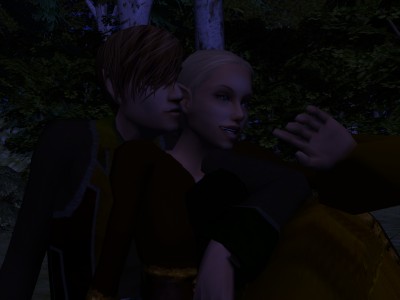
…the quotation from the Song of Songs: ‘Behold, thou art fair, my love; behold, thou art fair.’…
…and most especially, this is the chapter wherein Vash tells Iylaine how to communicate with him by moving a black stone from tree hollow to tree roots:
“Now, when I go home tonight, I shall find a round stone—let us say a black stone—and put it in the hollow. And whenever you come to the tree, you shall take the stone out and leave it on the ground between the roots, just below the hollow. And whenever I come, I shall put it back. And thus whenever you find the stone in the hollow, you will know that I have been near and have been thinking of you, and whenever I find it on the ground I shall know that you have been. Do you agree? Just like in the story.”
“What story?”
“An elf story, that I shall tell you another time. Shall we do so?”
“Aye,” she said softly. “But I would rather see you.”
He hesitated, and then he took a deep breath as if he had come to a decision.
“There’s more to the story, though,” he said. “If you find a pink stone in place of the black stone, then you shall know that I want to see you, and you should try to get out to find me. And if you ever need me—urgently, I mean, Iylaine—you should put a pink stone on the ground instead of the black. But if I find out you did it because you missed me, I shall be very, very angry,” he warned.
“But what if I miss you urgently?” she giggled.
“Not unless you come to the realization that you can’t live without me.”
“What if I do?” she laughed.
“Then leave a pink stone, and I shall come to you.”
Ah, she’s laughing. It’s still a joke to her.
But I think something has changed in Vash here. Not only is he finding it ever harder to hide his love for her, it seems like he’s hoping she’ll pick up on it.
And the look on his face in that last picture says it all. If he had ever looked at Iylaine like that when she could see his face, perhaps even she would have understood.
8. “Flann comes into the valley”
Published: November 22, 2006
Chapter Date: October 5, 1083
Synopsis: After having declared his love for Flann two days before, Osh has shaved off the beard he has worn all these years as an elven widower. His children are furious at this disregard of their mother. Both Osh and Flann are nervous about their new relationship, especially now that they are starting to see the effect it will have on their family, friends, and even their loyalty to past loves. But in this chapter, shy and nervous though they are, they seem to decide to give it a try.
Osh has a habit of pulling soooo romantic stunts, so what I especially like about this chapter is Flann.
In “Flann comes into the valley” she proves that she was quick to understand this little lesson that he gave her the day before in “Flann is scrached”:
“You wouldn’t be hiding any secret messages in your paintings, would you, Osh?” she asked softly and slyly.
He regretted then that he was not a poet like Sorin or Vash. Even Sorin’s most cryptic poetry was more easily read than what he knew how to express. What could he tell her? “I paint beautiful things because you are beautiful?”
“No little hearts peeking out beneath the leaves?” she whispered.
…
“It is a secret message for me only,” he said as a compromise, though even this cost him. “I remember all I am thinking when I paint everything. When I paint this and this and this. And it reminds me.”
He brushed his fingertips over petals that were shaped very like the strokes of hesitant fingertips.
“You couldn’t teach me to read them?” she asked.
…
“It is a complicated language,” he said. “Today we do only the simple lesson. There is a heart under every leaf and flower. However,” he said sternly, “it does not peek out. That is for saucy mice.”
“I see,” she nodded and smiled.
“Only once do I let it show. Only for a little while.”
“I saw.”
In “Flann comes into the valley” we have this:
Flann had always been too intimidated by the beauty of his paintings to touch them, but since he had told her they were full of secret messages for himself, she had noticed how often he ran his own fingertips lightly over a bird or a leaf. Now she could not resist tracing a hesitant finger along the eaves.
I believe that Flann is more sensitive and more capable of understanding and appreciating Osh than a lot of people (both characters and readers) give her credit for.
This chapter is a nice counterpoint to “Flann is scrached” because that one is from Osh’s point of view, and this one is from Flann’s. We can see them both feeling nervous and hesitant, unable to guess what the other is really thinking and feeling, but still very attracted to one another emotionally. I think Flann’s many gestures of gentleness and understanding in “Flann comes into the valley” show that their relationship is based on something real, and that she is a worthy match for him.
7. “Iylaine looks into Malcolm’s eyes”
Published: October 22, 2006
Chapter Date: December 4, 1082
Synopsis: Malcolm takes Iylaine to a clearing where they had liked to spend time together, and gets around to proposing to her by way of asking her what she would think of building a house there. Iylaine is very ill and believes Vash is dead, and still she hesitates. Then she realizes that Malcolm is the closest friend she has ever had, and she accepts.
This chapter could have been a tear-jerker too. Vash is dead, for all we know, and Iylaine is so very tired. But good ol’ patient, stubborn, unromantic Malcolm is desperately in love with her, and wants her so badly it hurts to watch. He has suffered so much these past months, caring for her, worrying about her, trying to save her. Now by offering to marry her he’s still trying to do what’s best for her—even if we have since concluded it was wrong.
For me there are two sorts of romance in this chapter. The first is Malcolm himself, with his broad mouth set in a firm line, making his offer in what he probably believes is a suitably solemn fashion. It seems hopelessly unromantic on the surface, but then you realize that he’s trying to think of everything she might like, and offering it to her.
This:
“Wouldn’t you like a house here, Babe?” he asked. “It’s so far from the road you can’t even hear the carters when they shout. And there aren’t any poplars now, but they grow quickly. And there’s a brook, and flowers, as you know. And sun and shade in the right proportion. Don’t you think?”
She realized suddenly that he was speaking seriously and truly wanted her opinion—not only on whether it would be an agreeable location for a house, but whether she would want to live there.
“I don’t know,” she said, though she knew it was a fruitless tactic.
“Is there another spot you would like better?” he asked gravely.
“No… I can’t think of any…”
“Neither can I. And I like this one because we have often come here. It belongs to us already.”
harks back to this conversation with Egelric in “Egelric gives Malcolm something to think about”:
“A little house far back in the trees,” Malcolm smiled, “with a brook behind, and poplars outside her bedroom window, and hives for bees. And a fire in every room.”
“Did she tell you all of that?” Egelric asked, surprised.
“Not exactly.”
Malcolm had been obliged to construct Iylaine’s dream house piece by piece out of the little things she sometimes let him overhear, as when she pressed her face against a poplar’s trunk or followed a bee from flower to flower and said to herself some simple phrase beginning with “How I love…“
and you realize that Malcolm has spent years collecting Iylaine’s every whim and desire in the hope of being able to offer them to her some day. Oh Lordy he is trying so hard. Patiently drying her tears, and making his solemn proposal and saying his solemn “I love you.”
The other flavor of romance that I find in this chapter is the shared memories these two have, and how it all comes together here for them.
There’s this from Iylaine’s side:
His eyes had been bright when he was a child, but even as a young man their warm brown was still flecked with shining gold, as if a few motes of dust had become trapped in his eyes, and trapped within the motes were traces of the slanting sunlight of suns long set. They reminded her of those lazy summer afternoons they had spent in the loft, in air that was warm and dust-sparkled and golden like his eyes. Sometimes they had talked and teased; sometimes they had fought and kicked and wrestled; and sometimes they had only slept in the hay, often with kittens, but always with each other for company.
He was, she reminded herself, the best friend she had ever had. It would not be so terrible a fate to sleep at his side, if she must sleep. And now she was tired, and she felt so cold and alone. Sleep and fire and company were no longer any relief to her. Perhaps it was Malcolm she needed. If she dove into his eyes, perhaps she could find again the warmth and ease and comfort of those golden summer afternoons.
And in this chapter they each learn that the other has remembered the conversation they had so many years ago in “Malcolm make a promise,” in which they both revealed their goblins-and-roast-grubs versions of “how many kids and what color hair” they want to have, and promise each other that they will pretend to get married someday so that they won’t have to marry anyone else.
But touched as he is to learn that Iylaine remembers all this, Malcolm has grown up meanwhile:
“What do you think, Baby mine? I’m a man now, or just about, and I want to marry this one particular elf girl, and live in an ordinary house made of timber, and have a reasonable number of ordinary-looking children, and eat bread and meat, and be happy. What do you want?”
Vash was always supposed to end up with Iylaine in my mind, but Malcolm totally won me over to his team in this chapter, with his plain-spoken but heartfelt proposal. I don’t think I’ve ever really looked back.
Sadly Malcolm’s story proves that no matter how hard you try, no matter how much you offer, no matter how true you are, you can’t make somebody love you.
6. “Flann sees the secret”
Published: December 9, 2007
Chapter Date: December 4, 1085
Synopsis: Osh and Flann have come to the abbey in the middle of the night because Flann has just seen Eithne’s husband and learned he is the demon Dre. They want the Abbot to marry them, because they believe that Sebastien is another demon and is trying to trick Flann into marrying him.However, Flann is heartbroken, because the last time they spoke of marriage, Osh made light of it and implied that he would never consent to a Christian marriage. Now she believes that he is only marrying her out of a sense of duty. But when it comes time for Osh to put the wedding ring on her finger, he shows her that he has carved a heart inside the band, proving he had always meant it for her.
This is one of those Whoa! of “Now that’s love!” moments I mentioned earlier.
After the highly romantic, earliest hours of their relationship, Flann and Osh have seemed to grow apart as Flann has suffered from postpartum depression. Their shyness and their hesitant affection have turned into real fear and timidity. By now neither knows how the other truly feels.
Osh fears that Flann would marry anyone who would take her, and doesn’t really love him. Flann fears that Osh is only marrying her in the Christian way because she needs protection, and it’s the noble thing to do. Meanwhile they are both painfully in love.
One of them has to find the courage to make the first move and reveal his true feelings, even believing they are not returned. And it turns out to be Osh.
Flann dutifully lowered her eyes, though she had scarcely glimpsed the ring. It had seemed only a plain golden band, fine and small enough for a woman’s hand—but it was only a ring. Perhaps he had traded some painted box or basket for it, to a man or lady who had no coin. It was only by chance he had it. It was not her ring. And she would never have another.
…
He took a sharp breath and began, “With this ring I wed you, with my body worship you… with my… riches… endow you…” His voice was slowing and lowering, like a stream of water trickling out to nothing. Without looking, he slipped the ring onto the tip of her thumb. “In the name of…”
“The Father…” Aelfden prompted after an awkward silence.
“The Father…” Osh repeated softly. He pulled the ring from her thumb and passed it onto her first finger, snagging it gracelessly over each knuckle as he pushed it more than halfway down. At last he looked at their hands—or perhaps the floor.
“And of the Son…” Aelfden whispered.
Osh said nothing, but after a moment he looked up at Flann again. His eyes were wide with desperation and startlingly blue behind a thick sheen of tears.
Flann opened her mouth to give voice to the animal cry of her wounded heart, but by chance, by happenstance, she had just exhaled, and her lungs were empty. She could not breathe.
At last, she thought, Osh had realized what the Sacrament of Matrimony meant. It did mean something to him. It meant something he did not want to share with her.
“And of the Son…” Aelfden said aloud.
Osh slowly pulled the ring off her finger without repeating the words. The hand that held the ring dropped to his side, but the other did not let go of her hand.
The Abbot folded his own patient hands over his prayer book. Liadan began to squirm. Flann managed one ragged breath.
Suddenly Osh stepped back and lifted the ring to her head, holding it up before one of her eyes. She saw his face through the hole in the center—white and wet, exhausted and unshaven—seeming so unreachably distant at the end of his long arm.
…
Osh said, “Look!” His voice was tense with agitation, but it was not cruel.
Flann tipped back her head until her one eye could focus on the ring itself, casting his distant face into a blue-white blur. The shaking of his fingers made the firelight dance over the gold, tracing every contour, but the rolling flashes of yellow light skipped over a tiny figure graven deeply into the inner surface of the ring. Gradually they revealed its form: two curved strokes coming together in a point at the bottom.
Into the empty space inside the ring—where it would be pressed against her finger, hidden from sight for as long as he and she would live—Osh had carved a heart.
He must have seen the recognition cross her face like a flash of light. He lowered the ring and looked into her eyes with nothing between them.
“There is a secret message for you to read. Only once I let it show.”
He could not have graven a heart into gold on their way to the abbey. As gradually as by the light, she understood that it was her ring.
Poor Osh was this close to putting the ring on her without saying a word. And she might never have taken it off to look inside until Osh was dead, or they were separated, or something happened to make it too late. Knowing Osh—the elf who paints the insides of bed frames, which no one will ever see—he never would have told her, even if they had lived happily ever after anyway. As he says: “Only once I let it show.”
5. “Sigefrith takes Eadgith home”
Published: May 3, 2006
Chapter Date: June 24, 1077
Synopsis: Sigefrith walks Eadie home from the Midsummer’s Eve festivities, and proposes to her along the way in Sigefrithian style.
What girl hasn’t dreamt of a handsome monarch falling in love with her and making her his queen? Eadie has spent many months trying to talk herself out of her crush on Sigefrith, but lately she has begun to nourish secret hopes, and tonight her dreams are coming true.
Nobody—least of all his own friends—would have associated Sigefrith with romance, but his proposal is inexpressibly sweet. In spite of his usual pragmatism and gruff joviality—and just as he did later with Cubby in “Sigefrith tells the plain truth”—he shows himself capable of great sensitivity, delicacy, and understanding.
Once again it’s hard to choose something to quote from this chapter because the whole thing is quotable. Sigefrith hits every note—from his thoughtfulness in offering shy Eadie an excuse not to say a single word, to his gently self-deprecating introduction, to reassuring her fears, to warning her to consider the responsibilities she would face as his wife, to his final jokey but still deeply personal proposal.
If I had to choose my favorite parts I would pick this:
When he returned he did not offer her his arm again, as a knight to a lady, but instead took her hand in his, as her father did, or as he did sometimes when he scolded her for neglecting to eat and marched her off to the kitchens.
His hand was big and square and strong, and hers seemed so tiny in his palm that for a moment it made her feel uncomfortably like a child. But then he twined his fingers between hers, not like a man to a little girl, but like the young farmers who had joined hands with their maids to leap over the dying bonfire and then slip away, laughing and whispering, into the trees.
Oooh the finger-twining!
And this:
“To be honest, I am enchanted by your pretty face, but not merely. In the two years I have had in which to observe you, I have witnessed kindness, generosity, forbearance, honesty, modesty, piety, respect for your betters and, more importantly, for your inferiors… and a good number of other pleasant things that I can’t call to mind just now.”
Teehee! So like Sigefrith the diplomat to start off with a laundry list of big words, and so like Sigefrith the foolish dragon to sheepishly conclude with a “a good number of other pleasant things.”
And then of course there is the proposal itself:
“I am not a poet but rather a diplomat, and thus I have said in many hundreds of big words what I shall now repeat very simply with short. Of course you know what I shall say, but I shall not deny you what I hope will be the pleasure of hearing it.”
He took her hands and held them against his chest, and he leaned his head to her until their foreheads met and his face blotted out the whole sky.
“This old dragon has broken the cardinal rule of dragonhood and fallen in love with his fair captive after letting her escape. But now he hopes she will agree to come back to him of her free will and stay with him always, not as his forlorn captive, but as his beloved wife. There, that was rather more silly than simple, but I think you understand.”
I just love that he proposed to her in such a silly way, because after all their joking it must have meant so much more to her than any fancy speech Alred might have written. But it was so intimate too.
And finally I love the ending:
He stepped away from her and offered his arm as a steady perch for her trembling hand. “Let’s get you home to your brother while I still have my wits about me. The next time I see you—and assuming you do not come to slay me with a refusal—I shall simply dote on you like the foolish old dragon I am.”
They walked a few steps in silence, and then he said wryly, “I note that you did not tell me that I am not foolish.”
Eadgith laughed.
They are so lovely together. It’s nice to see a Lotherian couple just plain old right for each other, and so happy! ![]()
4. “Gunnilda has an unexpected visitor”
Published: May 20, 2006
Chapter Date: February 15, 1078
Synopsis: Gunnilda is grieving because she has recently lost another child. In the early evening she sits at her table to rest and enjoy a quiet moment in the house. She is interrupted by a visitor—who turns out to be Egelric. She has not spoken with him since before her baby died—since before that visit when he roughly kissed her in an attempt to prove he was a bad man. Gunnilda is stricken by how weary and worn-down and sick in the soul he appears, and she is moved to hold his hand. Before either can speak, little Wynna comes in from the back and interrupts them, and Egelric leaves at once.
This chapter breaks my heart again every time I read it. They were so close—just long enough for the sun to set a little, and the sky to turn from pink to gold. And then, like the sun dipping below the horizon, everything went out at once. Except for “Egelric is told” over two years later, we’ve not even seen them together in a chapter ever since.
There was the hand-holding of course:
Without thinking, she laid one of her own hands over his and was almost surprised to find it warm and alive.
Her small hand slipped easily into the space between his thumb and his curving fingers, and her fingertips found his palm. Her thumb reassured itself of the solid knuckles, of the tendons across the back of his hand, of the dark hair on the backs of his fingers. Her fingertips explored the creases of his palm and found the calluses of reins, of sword hilts, of other things she could not guess.
His hands were not dead. They still worked, still knew how to work, and in the faint play and spring of the muscles she could tell that they were still strong. They were merely waiting to die.
He still stared at the lamp, and for a while he gave no sign of noticing her hand, or even her presence. But gradually she realized that his fingers had been curling closer around hers until finally he had pressed her fingertips into his palm and she could move them no more.
They sat a while thus, and neither spoke, and the fire and the sun burned low.
For a man of so few words, that sort of thing would be his most eloquent expression of love anyway. Wounded animal though he was, for a few minutes he sat still for her and let her touch him.
But that wasn’t the most romantic moment of this chapter. It was this:
“Come in,” she said. “Won’t you take off your cloak and have a chair?”
He stepped in after her and busied himself with removing his cloak. He went to hang it on the peg, and she saw him hesitate a moment before the old plaid. And then he hung his cloak atop it.
“The old plaid” is the cloak he lent her six years before in “Egelric has a late visitor”:
He took his rough old woolen cloak from the hook and wrapped it over her shoulders, thinking as he did of the contrast between dark little Gunnilda, who snuggled gratefully into the humble plaid, and his red-haired wife, who would stand tall and wait for him to drape her embroidered shawl over her proud shoulders as if she were granting a favor. He shook his head grimly. She was still haunting the house tonight.
“Come,” he said, taking down for himself the cloak he was to wear tomorrow. “I want to see you safely home.”
It appeared again for a cameo in “Alred comes for another difficult conversation” in 1077:
“It must be something to be loved like that,” Gunnilda sighed.
“I believe you are.”
She glanced up at Alwy’s old cloak, where it hung on a peg next to an even older, heavier plaid wool cloak that Alred had never seen him wear, and the children’s little cloaks and shawls behind.
“I guess I am,” she agreed. “But then, it must be something to love like that.”
“It is,” Alred said.
Gunnilda has kept that old cloak all these years. How I wish we could know his thoughts during that instant of hesitation!
3. “Gunnilda gets a surprise”
Published: May 20, 2006
Chapter Date: February 15, 1078
Synopsis: Alwy has secretly been building a new house for his family, but Gunnilda has finally caught on that he’s been sneaking around and demands an explanation. Too simple to make up a story, Alwy is obliged to take her to the new house, which is nearly finished, and show her around.
This chapter features both Awwww! and Woah! Gunnilda herself can’t believe that Alwy not only came up with such a plan but put it to such successful execution, even with help from their friends—and kept it secret all this time!
The Awwww! part comes in at the end. Gunnilda is, we well know by now, in love with Egelric, and even pauses to caress the window pane with Alwy tells her she’ll be able to see Egelric’s chimney smoke from her kitchen.
But then Alwy takes her to her new bedroom, and we have this:
She turned to him with a smile, but with tears on her cheeks.
“Don’t you like your new house?” he asked, heartbroken.
“I guess it’s too nice for me. I guess I’m just waiting for the fine lady to come home and make me get out of her house.”
“I guess you’re the fine lady now, Gunnie.”
“Does that make you a gentleman?” she smiled.
“Well, I don’t know, I guess I’m still just old Alwy Hogge. But I bet when you was sixteen and got married to old Alwy Hogge, you never thought he would give you a house like this someday!” he laughed.
“No, I guess I never did,” she admitted. Suddenly she was moved to kiss his sunburnt cheek, which only caused him to chuckle again. “Don’t you laugh, ‘old Alwy Hogge,’” she said, regaining her spirits. “I guess you never thought you would give a me house like this someday, neither!”
“No,” he said, pulling her close and mumbling shyly into her neck. “No—but I wanted to.”
Awwww!
2. “Flann learns to write”
Published: June 7, 2007
Chapter Date: September 25, 1085
Synopsis: Flann is beginning to suffer from the effects of postpartum depression, and she has chosen to stare at a foggy window in an empty room rather than join the laughter and companionship of her family in the hall. Osh joins her and laments that he can’t tell her everything that’s on his mind because the elves in the other room will hear. Then an idle thought of Flann’s gives him an idea for a way to communicate his message.
In terms of sheer storybook (or chick flick?) romanticism, I think Osh’s gesture here would take the #1 spot:
She lifted her hand and stroked a fingertip across one of the foggy panes.
“If I knew how to read and write,” she giggled, “we could write secret messages tonight. No one would hear.”
“I can teach you!” he whispered eagerly.
“Ach, Osh! I’m not as clever as that.”
“I think you are clever enough. Tonight we do the quick lesson. I show you how to write the secret message I want to tell. And you shall guess what it means.”
“Osh!” she groaned as he took her hand in his. “It doesn’t work that way. Letters are…”
He touched the tip of her finger to the glass.
“Letters don’t mean anything one can guess…” she mumbled as he began to draw.
He did not draw a letter. He sketched only two curved strokes coming together in a point at the bottom. When he had finished he did not drop her hand, but held her finger there against the cold pane. He had drawn a heart.
She felt a drop of fog-water welling up beneath her fingertip, swelling until it grew too heavy and slid down from the point like chill blood. Then he let go.
I got this idea one night when I was just falling asleep with my face inches from the wall. I was imagining a rambling conversation between Osh and Flann, whispering it to myself as I sometimes do, and perhaps my breath coming back off the wall reminded me of foggy windowpanes and gave me this idea in a flash of inspiration.
Thereupon I merely had to slip in a chapter—“Cat reveals a clue”—with Cat instructing Osh about the human association of the heart shape with love, and thus was born this sublimely romantic soul hidden away beneath Osh’s funny-mustached art teacher exterior. Osh has his flaws, to be sure, but when he lets his secret messages show, he can make Sorin’s and Vash’s poetry seem like tawdry affectation.
1. “Matilda sends for Alred”
Published: February 9, 2006
Chapter Date: March 21, 1074
Synopsis: Matilda has sent for Alred because she knows that she is going into labor, about to give birth to the baby who will be their daughter Margaret. She wants to say a few things to him in case she will never have another chance, and she reveals that when he was courting her, she had copied all the poems she had pretended to scorn into her mother’s Psalter.
Only for a woman like Matilda would a foray into sentimentality convince her husband she was dying. Indeed, she’s brutal with him, phrasing all her musings as last wishes, and seemingly unaware of just how much it’s hurting him. And yet Alred needed so much to hear all these proofs of her love.
Twelve years later he told Margaret that this was the one night of his life that he would live over again, if he could choose any one.
Most particularly she told him about the Psalter, whose romantic and tear-jerking role in this story is far from over:
“Alred,” she said a few moments later as she relaxed into a dreamy smile, “do you remember all of those poems you wrote for me when you came back from Wales with Sigefrith and Harold and met me for the first time?”
“Do I? I remember my poetry was what caused you to break your oath never to laugh again! How dreadful it must have been!”
“Oh, no,” she murmured. “I was so proud and so flattered, though I could never tell you so. And I copied them all down into the blank spaces in my old Psalter that I had from my mother—such a naughty girl I was, writing in my books! But I said to myself: here is my own Song of Songs. You never knew that, did you?” she smiled. “I never let you see that book. I don’t know why. Perhaps it was wrong. It must seem as if I didn’t want you to know how I loved you. Ah, I see I did make you cry, you ass.”
She tried to lift her fingers from his lips to his wet cheeks, but she was too weak even for that, and she sighed. “I have it hidden away in that red leather bag with my father’s knife and the Gospels that Godwin gave him, and which you always said were so ugly it seemed like blasphemy. Do you know where it is?”
He nodded.
“Listen: I want Dunstan to have the Gospels, and Yware to have the knife, but most importantly I want you to give the Psalter to Gwynn when she is grown. And I want you to tell her what her mother said, which is this: Until you find a man who loves you this much, wait.”
He stared into her eyes for a long while, until he thought he saw tears of her own. And finally he said, “Then she must die a maid.”
“No, don’t wish that for her,” she said gently. “I hope she will have the happiness I have had.“
Whoa! Matilda almost cried!
Alred reveals how much this meant to him in “Alred does not refuse,” when Alred will not betroth Gwynn to Caedwulf:
“The other reason is simply that I once made a promise to Matilda that I do not wish to break.”
“Matilda? Why? Did she have someone in mind for Gwynn already?”
“No. But she once asked me to tell Gwynn to wait until she had found someone who loved her as I loved her mother.”
Sigefrith sighed. “What sort of argument am I supposed to raise against that?”
“I don’t believe there is any argument that can stand against that,” Alred murmured.
“Damn you! Alred! Will you let the girl marry a cotter, then?”
“If he loves her as I loved her mother. And if she loves him.”
“Alred.” Sigefrith shook his head. “How can I say this? That won’t work. This is real life we’re discussing. You live in poems, but the rest of us don’t. And I have a son who is a prince, and who needs a wife. And you have a daughter who is a duke’s daughter, and the granddaughter of a princess, and the cousin of a mighty king.”
“She’s Matilda’s daughter. And Matilda wanted that poetry for her.”
“Alred…”
This request of Matilda’s was perhaps his finest proof that she had loved him once: Matilda had loved him enough to want a love like his for her beloved daughter. He would cling to that idea until the day he died. Indeed, that idea was the spar to which he clung whenever despair began to drag him down to death.
“If she were here, we could ask her,” Alred said softly. “She is not, and so I must keep my word to her.… Matilda’s advice to her was this: ‘Until you find a man who loves you so, wait.’ You may wait or not, as you like. You are king here. But Gwynn is my daughter, and Matilda’s daughter, and I shall tell her what her mother asked me to tell her.”
Granted, Matilda is woozy from illness and pain in this chapter, but if she is only telling Alred now, somehow I can’t believe it was merely from lack of courage. Perhaps she wanted to keep that secret until she was able to reveal it to her daughters herself in a mother-daughter moment. Or perhaps she merely delighted in having such a secret.
Alred seems to have come to the latter conclusion. When he makes up his mind to show the Psalter to Dunstan in “Alred lends Dunstan a book,” he says this:
“It is another piece of advice,” his father continued hoarsely. “Never miss an occasion to tell or show a woman how much you love her, even if you think you will look like a fool. You never stop looking like a fool as long as you love, anyway. And she may laugh at you. But she will keep all these things, and ponder them in her heart. Let me show you something.”
Alred is paraphrasing the Book of Luke there, after the angel of the Lord has told the shepherds about the birth of Christ:
And all they that heard it wondered at those things which were told them by the shepherds. But Mary kept all these things, and pondered them in her heart.
—Luke 2:18 – 19
Alred, I think, believes it’s a lovely, womanly thing to do, and we never saw him lamenting “You never told me” the way Iylaine did. If anything he was honored that she had treasured this secret in her heart, the way she treasured his poems in her Psalter.
But I am so grateful she told him once. She later gave both us and Alred plenty of reasons to doubt her love for him. But this chapter, and that Psalter, prove it once and forever. And by trusting that secret to Alred, she will be able to pass on her love and her wisdom to her daughters.
Recap of the Top 10
- “Matilda sends for Alred”
- “Flann learns to write”
- “Gunnilda gets a surprise”
- “Gunnilda has an unexpected visitor”
- “Sigefrith takes Eadgith home”
- “Flann sees the secret”
- “Iylaine looks into Malcolm’s eyes”
- “Flann comes into the valley”
- “Iylaine and her cousin agree”
- “Sigrid is steadfastly minded”
Some Runners-up
- “Iylaine meets another cousin”
- “Iylaine finds the water wet”
- “Egelric has a late visitor”
- “Alred sees no poetry”
- “Vash finds a stone”
- “Iylaine gets wet and dry again”
I just noticed that except for Osh and Flann’s three spots in the top 10, all of the Top 10 Most Romantic Chapters are before Chapter 1000 – which puts them all in 2006!
Granted I wrote twice as many chapters (973) in 2006 as I did in the next highest year (421 in 2007), and only 77 in all of 2009, but even so… 2006 was a swoon-filled year!
What do you think? What’s your favorite romantic chapter? And I wonder what Gwynn would say if she could read all this! ![]()







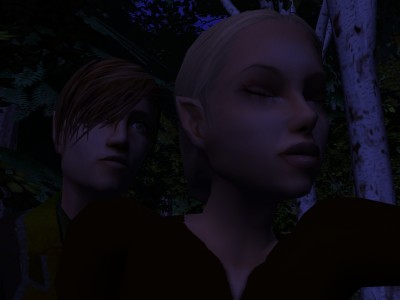
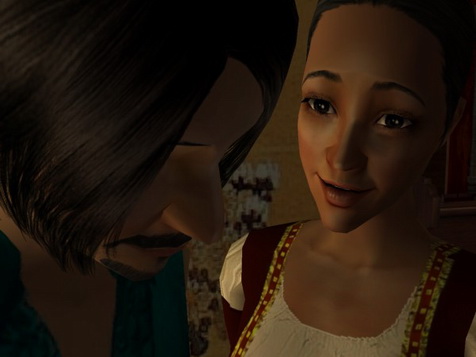
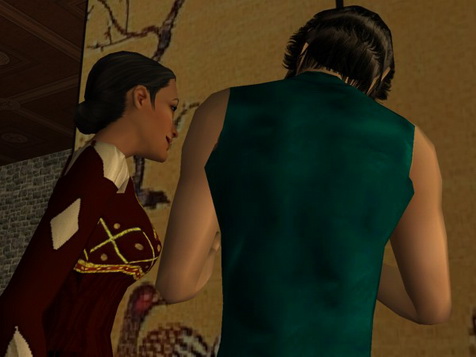

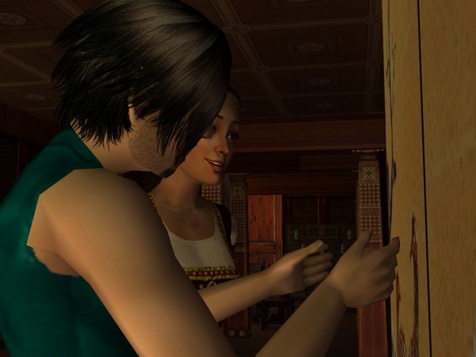
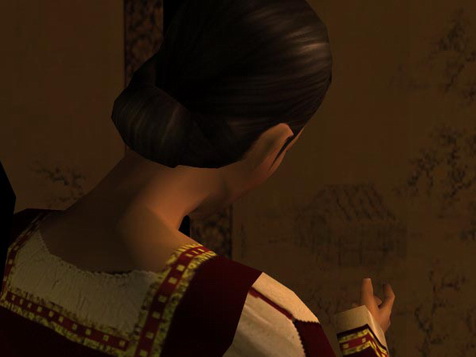






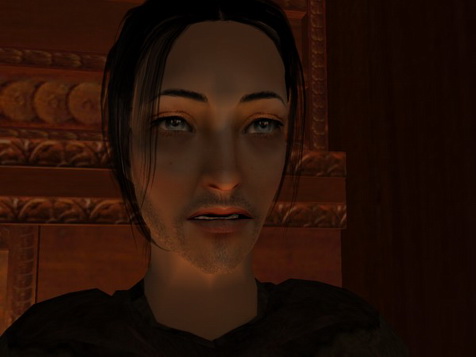
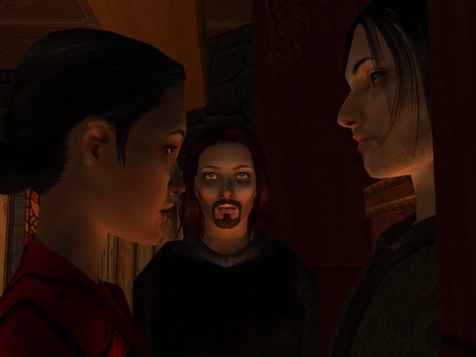
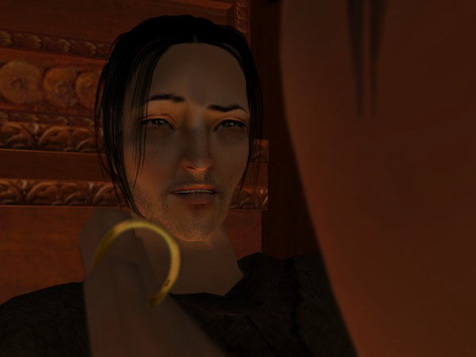
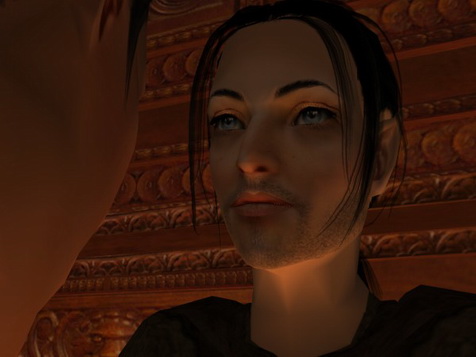
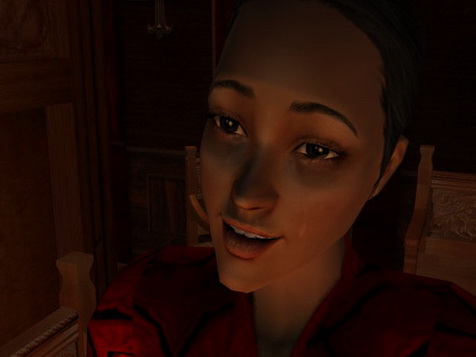






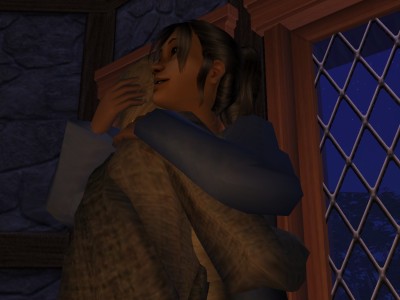
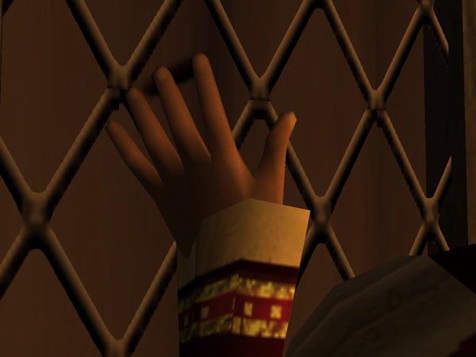
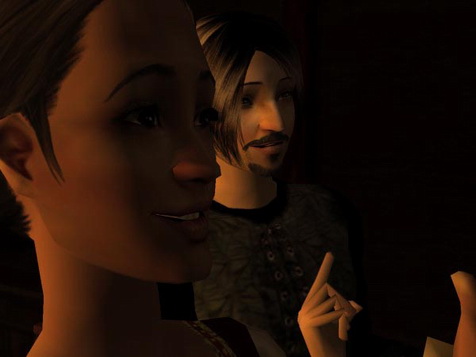
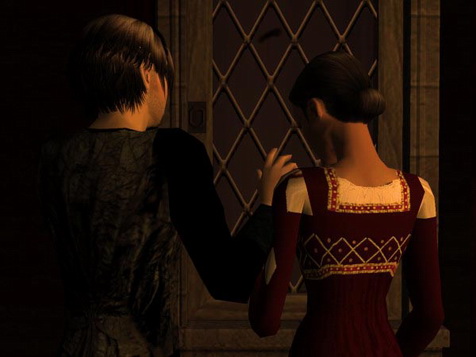


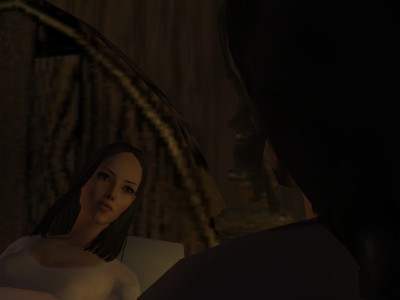
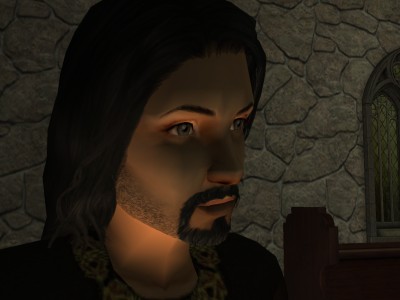
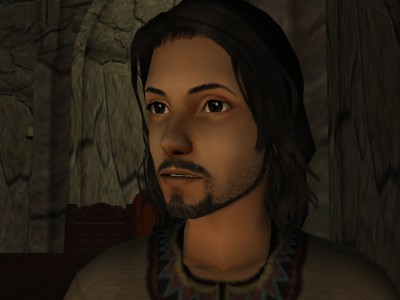
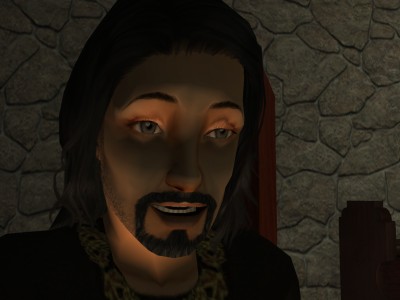


I’m so glad this list is up. I have to say i totally forgot about some of these chapters so its lovely to read them again. The Gunnilda and Egelric chapters about the plaid are so touching, i’d never really thought about his hesitation before.
I obviously agree with you about Alred and Matilda for number 1, i’m not sure any other chapter can ever beat that! I would have included some of the Mouse and Wyn moments too – i think their proposal scene was really sweet.